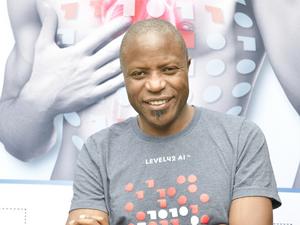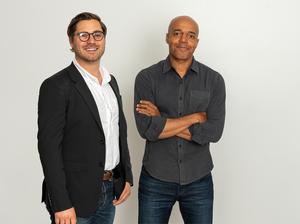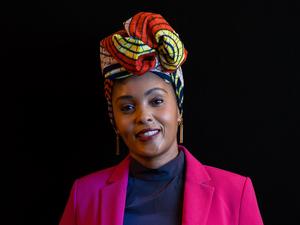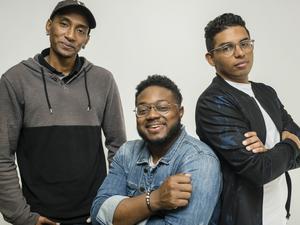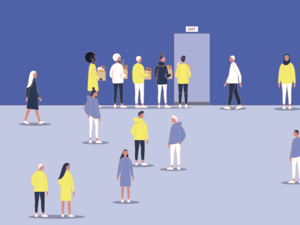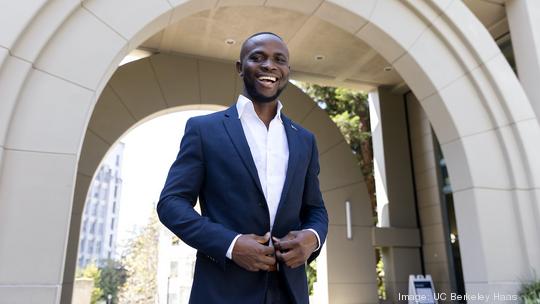
If you've watched the most recent season of Netflix's reality dating show “Love is Blind,” you'll be familiar with SK Alagbada. Netflix recruited him via Instagram to be a contestant on season three of the show, which brought together 15 men and 15 women to date each other sight unseen — a literal twist on the concept of blind dates. They only meet in-person after they get engaged, and then decide whether they want to say "I do" or "I don't" a few weeks later on their wedding day.
Alagbada is currently attending UC Berkeley Haas to pursue an MBA with a focus on venture capital. He co-chairs the university's Launch Accelerator for startups and helps lead the organization's strategy and fundraising efforts. In addition, he's the president of the Haas Africa Business Club.
Originally from Nigeria, Alagbada moved to the U.S. about 15 years ago and most recently lived in Dallas, where Netflix filmed the latest season of “Love is Blind,” before he moved to Oakland to attend Haas. His imminent departure to the Bay Area was a point of tension with his fiancé, Raven Ross, during filming. Since the season aired, cheating allegations have surfaced against him, as well, and he has taken legal action against the accusers.
"There is no lawsuit against me from Netflix or the production company. To the contrary, I am the one taking legal actions against some of the accusers for attempting to extort me," Alagbada told me.
You'll have to watch the show (or poke around the internet) to see how the season ended for Alagbada and Ross.
Before moving to the Bay Area, Alagbada was a data engineer at corporations like JPMorgan and General Motors and spent time working with their innovation arms.
"I've had the opportunity to work within those companies where I'm able to experiment almost like a startup… where you're able to test ideas, you're able to build quickly and fail quickly, in some cases," Alagbada said. "When I came to business school, I really wanted to do that quickly at scale… immersively. And that led me into the startup world and UC Launch.
I recently spoke with Alagbada about his interest in venture capital, the opportunities that he sees for founders and investors in Africa, and how his relationship with social media has changed since appearing on “Love is Blind.”
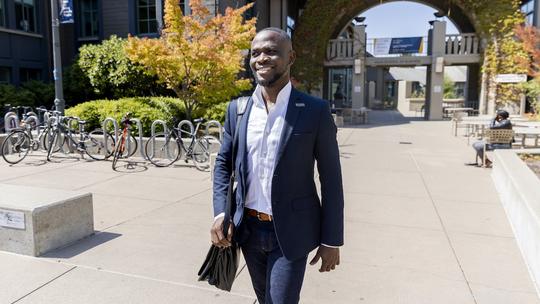
What inspired you to pursue venture capital and investing? When I left Nigeria about 15 years ago, the dot com boom that happened here in the U.S. was just not happening in Africa. Some of my friends, my colleagues, people I went to school with and grew up with are now founders of tech companies today. Some of them exited, some are still building as entrepreneurs back home. I left at a pivotal time when that wave was just not happening.
I see the gap between startups back home in Africa struggling trying to build a network here or even get access to resources, mentors, capital here in the West. I angel invest myself in Africa. Emerging markets has been a passion of mine.
Another thing that attracted me to VC was, you know, coming from a technical background, I have a pretty good network of engineers. And portfolio company recruiting is something that a lot of VC companies struggle with. So, one of the values I've gotten to bring to the VCs I've worked with in the past is I help them champion technical talent sourcing for their portfolio companies.
Do you think the disconnect between access to capital in the U.S. and in Africa has changed over the past couple of years? No matter how smart you are, people conduct a vibe check. If you don't pass their vibe, they don't really want to put you in. Unfortunately, that's very endemic to the venture capital industry.
The numbers of women managers in Africa is way more dismal than what it is in the U.S., because in those emerging markets, women already are very disadvantaged. So when you add those extra layers of raising capital or starting a company, on top of that, it just makes those numbers look worse. But at least I think by identifying the problem, there has been more progress that's been made. We now know that the problem exists.
One day, do you hope to have your own VC firm? I do see starting my own VC fund as one of those possible potential tracks for me to go post-MBA… I'm mostly interested in the early stage. I've been very attracted to fintech as well as enterprise SaaS. I feel like once you solve for fintech, you can sell a lot of things that are important on top of that. I also like how enterprise SaaS empowers a lot of other business verticals.
Do you have an idea of where you might like to launch your own firm? I have pretty big network both here in the U.S. and in Africa. In a perfect world, I would see a situation where my fund would have offices locally in the U.S. as well as back home in Africa.
What are some of the biggest opportunities that you see in Africa? The Africa opportunity is something that has been very overlooked for a very long time. There's a lot of macroeconomic trends pointing towards making Africa a priority right now… I always say that Africa has a lot of problems, yes, but that also means a lot of opportunities, right? There's so many things we've solved for here in the West that are still very nascent and unpenetrated there.
About 40%, if not half, of the capital that's gone to Africa has gone to fintech because a large population in Africa is still unbanked. For example, using people as ATMs where they go around with a POS system and you just swipe your card and get cash from them because it's very heavily a cash based society.
A lot of trade and commerce is still done very informally, where people don't have records or a CRM system or inventory management systems… There's still a huge percentage of commercial activities that's going unrecorded.
People are going straight into mobile phones and data and smartphones, where they didn't have to go through dialup (internet). Their first experience with technology is straight to a mobile phone. And that means a lot of pain points and transitions that we had to make here in the West, they can leapfrog that by just going straight mobile.
Some people are saying that social media is dead as we've known it for the past two decades. Do you think social media is still necessary as a businessperson? I don't think social media is dead or going away anytime soon. It's only gonna continue stratifying where people will use different types of social media to achieve different purposes. There's still people that are heavily dependent on Facebook Marketplace or Facebook Groups. Where people have found communities and they're very, very loyal, it becomes sticky to them after a while.
Especially as somebody who's been on reality TV, which social media plays a big part in, do you think it's possible to separate your personal life from your social media presence? One thing I really like about social media is that you have the freedom to design how you want your brand to be. … What I really miss, honestly, is my life before “Love is Blind” where I only have people who follow me on social media because of what I was doing then and because of the conversations I chose to engage in. My social media posts in the past could go from something like talking about the FTX and crypto crash and then all of a sudden something from Animal Planet. It just shows all my interests at the same time in a very eclectic way. And now that you have so many people following you, you have to double think and triple think every single time before you post anything to check it to make sure that it's right. All those little nuances, it becomes too tedious for me sometimes. And I'm also very busy as a business school student. It's definitely not as natural as it used to be.
Do you feel like social media is more of a tool for you now? I still see it as a tool and a platform for me to at least introduce the world to certain things that they might not be familiar with, and for that I'm very grateful. But I honestly wish I had just my old squad back. Just people that I know. It's very easy to lose your personal life and your personality. And for that, I just use normal interactions with people. I call them. I see them in person. As opposed to just using social media to follow up with friends and family. I just have to go back to the old conventional ways of doing that now.
So for you, social media is not intimate anymore and you're actually taking those personal relationships offline? Exactly. Yeah, that's what I'm doing.
